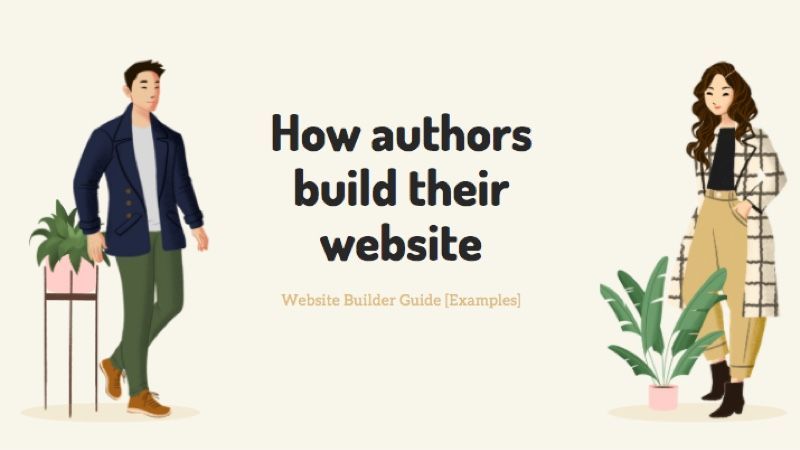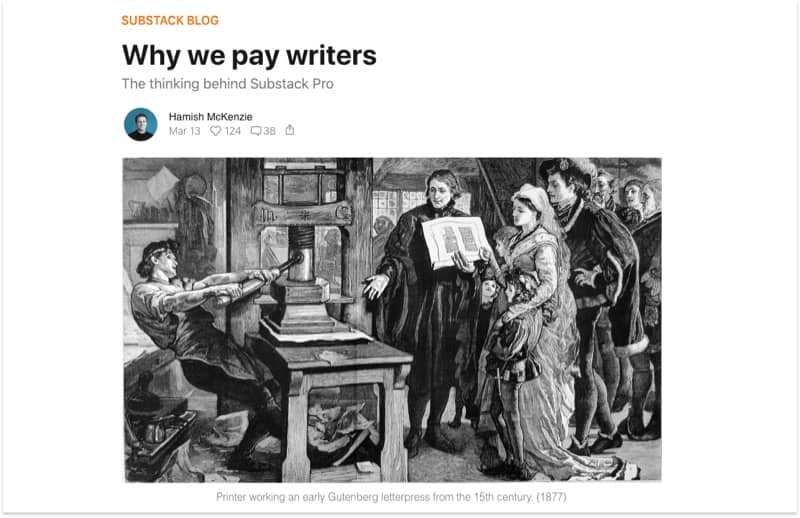Top 6 Website builders published authors use (with Examples)
 By David Nge | Last Updated: November 19, 2025
By David Nge | Last Updated: November 19, 2025
My work is supported by affiliate commissions. Learn More
 By David Nge | Last Updated: November 19, 2025
By David Nge | Last Updated: November 19, 2025
My work is supported by affiliate commissions. Learn More
If you're a writer or an inspiring author, and you're wondering which website builder or platform is best suited for you. Then read on as we uncover all the top website builders published authors are using to publish their writing, build their brand, sell their products.
This guide is the culmination of weeks of research trying different publishing tools for author websites to answer these questions:
Need inspiration? Here's a visual list of best author websites and what makes them great.

Wordpress — Best overall. Flexible, great for blogging, and most published authors use it. Requires high maintenance and technical skill (or hire someone) to set up.
Squarespace — Easy to set up and user friendly. The website is managed for you (low maintenance), has great support, templates are designed by world class designers, but less customizable.
Kit — Build a single-page website with a powerful email marketing system designed to help authors build an audience, promote and sell digital products (e.g, ebooks, online courses, etc.).
Wix — Highly customizable, easy to set up, they manage the website for you. It's free to use with affordable pricing for advanced options. However, it's hard to migrate your website once set up.
Ghost — Content management platform built for writers. Great writing experience with full creative control of the website. All content and data are yours to own.
Substack — Newsletter platform that helps authors monetize through paid subscriptions. You get a clean, minimal website with the option to add a custom domain.

You've probably heard of Wordpress. After all, it is the platform that powers a quarter of all websites on the internet. Not surprisingly, it is also the writing platform of choice for most published authors. And there are good reasons for that too.
On Wordpress, any author can:
Publish long-form content regularly — Wordpress offers the most comprehensive blogging features out of all writing platforms.
Design and customize their website without coding — There are several drag-and-drop page builders plugins, such as Elementor and Divi, to name a few, that have made web design incredibly accessible for anyone without technical skills.
Collect and grow email subscribers — Wordpress integrates with most email marketing platforms (Mailchimp, Hubspot, Drip) via plugins.
Sell products — Via Woocommerce, a free eCommerce plugin for Wordpress
Promote their brand — Again, Wordpress integrates with hundreds (if not thousands) of marketing software that helps get the words out about your product.
And more.
Tim Ferriss — #1 New York Times bestseller, author of The 4-Hour Workweek, publishes his latest writings, hosts his podcasts, and sends his (1.5M+ subscribed) newsletters.
Kon Mari — Author of the (also) #1 New York Times bestselling book, "The Life-Changing Magic of Tidying Up", uses Wordpress to build her brand site and occasionally publisher notes on spark joy living.
James Clear — Who has been writing on his Wordpress site since 2012 and is now the author of the New York Times bestseller, Atomic Habits, has published over 100 articles to date and manages his (1M+ subscribed) newsletter over there.
Several other notable ones include Elizabeth Gilbert, Brene Brown, Bronnie Ware, David Epstein, Debbie Macomber, Ryan Holiday, Janet Mock, Marie Force, and many more, all of whom choose to build their branded site on Wordpress.
A few things to consider when choosing Wordpress. It's not for everyone considering the time, energy, and resources needed to maintain a Wordpress site.
Wordpress is versatile and powerful. You can build an incredible branding site or blog with the thousands of plugins available. All the authors' sites mentioned above should be a testament to that.
You can save a considerable amount of money if you're willing to spend time learning to set it up and get familiarized with the whole web development process. Otherwise, you should expect to hire someone to do it for you.
Note: There are 2 version of Wordpress. Wordpress.org and Wordpress.com. The one mentioned above is Wordpress.org (Open source), while wordpress.com is a managed website builder service with premium hosting.

Ever heard of "effortless beauty"? Well, that's what working with Squarespace and feels like. Seriously. It's easy to create a stunning website without putting in much effort. In part because you're working off of award-winning designer templates.
Squarespace won't allow you to change every aspect of the website, but every page element you do get to add or edit will fit the existing template perfectly, like lego pieces. And they are guaranteed to work flawlessly on all desktop and mobile devices. That's how they maintain a minimum aesthetic benchmark for all its sites.
Other features Squarespace offers that are appealing:
In short, you can think of Squarespace as your very own IT department. They manage all the website backends and create beautiful templates so you can focus on creative writing. They even provide dedicated 24/7 support if you ever run into trouble.
Morgan Harper Nichols — Morgan Harper Nichols is an artist and poet whose work is inspired by real life interactions and stories. She recently wrote How Far You Have Come, an exquisitely illustrated collection of poetry and essays on her journey as a writer.
Jennifer Niven — Jennifer Niven is a full time author who tells stories about ordinary people doing extraordinary things. Notable work includes Ada Blackjack: A True Story of Survival in the Arctic and The Ice Master: The Doomed 1913 Voyage of the Karluk.
DIY Author — DIY Author is a resource site dedicated to helping authors create their work, publish their book, and build a business. It was created by Chris Well, a published novelist who has written suspense and mysteries for traditional publishers and as a self-published author.
Yassmin Abdel-Magied — Yassmin Abdel-Magied is a Sudanese-Australian author who published her best-selling memoir, Yassmin's Story, with Penguin Random House at age 24. She built her personal brand on Squarespace, where she features her best writings and media engagement.
Squarespace is great for artists, writers, and independent entrepreneurs who care about creating a beautiful brand online. They've put a lot of thought into building an intuitive user interface and making the whole website-building experience as seamless as possible.
Squarespace will take care of all the hassle that comes with managing the website. They’ve made it easy to build a stunning website without technical skills. All you have to do is sprinkle some personality and write your own story.
Also read: Wordpress vs Squarespace vs Wix vs Weebly

Kit (previously ConvertKit) started as an email marketing tool but has since grown into a platform that helps creators connect with true fans and earn a living by selling digital products and services online.
If you're an author who aspires to write and sell books one day, Kit is a great tool to help you achieve that vision.
Landing page builder —Build a custom landing page (e.g., Marketing page for a book launch) for people to sign up and get noticed.
Email sign up forms — Powerful sign up form (or contact form) that can be embedded into any website or blog to build a mailing list. You can customize the placement and appearance of your sign up form to meet the needs of your websites.
Email designer —Imagine a drag and drop website builder but for email. You can customize email layouts, add buttons, email, format, and more without touching any code. All your emails will be responsive to fit any device.
Automate & personalize email — Segment your audience, set up rules and customize a subscriber's email journey based on their actions so you can send targeted content to the right people at the right time.
Commerce — Converkit makes it easy to sell digital products such as ebooks for paid newsletters with its commerce tool. Simply create a product page, add your content, and it will automatically be sent to the customer once they've paid.
Ed Latimore — Edward Latimore is a retired American professional boxer and is now a best-selling author of several books. His writing focuses on self-improvement and a practical approach to stoic philosophy.
Srini Rao — Srini Rao turned his blog into a WSJ bestseller but struggled with his writing business. It wasn't until years later he made a come back with self publishing.
Deborah —Deborah is a homesteader who became an author when she decided to teach her fans how to raise goats sustainably. Since childhood, her big dream was to be an author, and now she's signed a contract for her third book.
Cons
Kit's main value proposition is to help authors (or any creators) build an audience, and they do it primarily with their email marketing prowess.
The cost grows substantially when you add more subscribers over the long term and is only worth it if you take advantage of their email automation and personalization tools.
That said, many authors and creators stay loyal to Kit because they are run by a fantastic team.

If you like the idea of outsourcing website management to someone else WHILE still maintaining complete creative control of your site, then Wix is the website builder to look into. Wix is also a drag-and-drop website builder for authors, except you can customize every single aspect of your website.
1) Wix allows complete customization, while Squarespace lets you edit on pre-defined layouts.
2) Wix has the second largest third party plugins marketplace (after Wordpress), while Squarespace has limited integrations.
3) Wix offers a (generous) free plan, while Squarespace doesn't, though they offer a free trial.
That's not all, Wix is exceptionally versatile, with all kinds of features that benefit an author website:
And more.
Romi Neustadt — Romi is a mom, yoga-loving flexitarian, and entrepreneur who empowers women, and helps them figure out what they want and how to make it happen. Her latest book You Can Have It All shows you exactly that.
Taylor Tyng — Taylor is an author of 3 books who find joy in writing for middle grade readers, who are no longer children but not quite adults.
Kiru Taye —Kiru writes passionate romance and sensual erotica stories featuring African characters on the continent or in the Diaspora.
Emma Davies —Emma has produced over a dozen novels, all of which make a great bedtime story. Some of her best works include The Mystery of Montague House, The House of Hope Corner, and Letting in Light.
John Clarkson —John wrote his first crime thriller, And Justice For One, which was made into a screenplay adaptation for Paramount Pictures.
Trevor Cosson — Trevor is a professional writer whose work span fiction, real life stories, and copywriting. You can find his latest writing and portfolio on his Wix site.
Alan Allinger — Alan has been telling stories his entire life. From Oscar winners to Sci-Fi hits, to shows from the Shondaland empire, chances are Alan's work has shaped some of your favorite visual stories.
Ajinkya Dharane — Ajinkya mostly writes crime fiction for fun. His work mostly involves some kind of conspiracy theories and classic whodunit crime stories.
Wix is a jack of all trades. It is the most customizable, has the most features, with the most plugins (among website builders), and it's free too. It's hard to beat in terms of the value they provide.
But, Wix is also known for its slow interface, which can be frustrating for anyone trying to set up a website independently. It's also hard to migrate or change your website design once you set it up.
It gets the job done (probably more), but don't expect a 5 star website building experience from Wix.

Ghost is a publishing platform specifically made for writers who want full control of their site and make a living with their writing.
The thing with website builders and other publishing platforms like Medium and Tumblr is that:
1) You don't truly own the content
2) You can't export your website if you want to
3) And they're suboptimal if you wish to build a business with your writing (because you lack full control).
Enjoyable writing experience — Ghost uses the markdown editor. It's clean, fast, and allows you to format lists, headers, emphasis text, as well as incorporate links and images all with native keyboard shortcuts!
Full control — When you create your website on Ghost, you literally own every aspect of it.
The content, your email subscribers, customers (if any), design, even the code for the platform. Because Ghost is open source, which means anyone has access to the source code. You can change it or move it to another platform, whatever you fancy.
Build a writing business — One of the best Ghost features is its ability to allow writers to create membership and accept payments. This empowers writers to earn a living by creating unique content, build a following, and offer premium membership.
Troy Hunt — Troy is a Pluralsight author of many top-rating courses on web security. He frequently blogs on his site and uses it to promote his security workshops, where he teaches technology professionals how to break into their own applications before other does.
Ali Abdaal — Ali is a doc, Youtuber, and podcaster who frequently writes about actionable productivity tips, practical life advice, and high-quality insights from across the web.
Jeff Atwood — Jeff runs Coding Horror, a blog on programming and software development, where he studies, research, and share exciting news in the industry.
Joel Gascoigne — Joel is the co-founder and CEO of Buffer. He frequently writes about business, remote work, and travel on his site.
A few things to know about Ghost:
If you're an author and aspires to build an audience and a business, then Ghost is the best platform for it. They're trusted by the world's leading writers, creators, and professional content teams.
The writing experience on Ghost is delightful, they value speed, privacy, and speed, and they run a high integrity business supporting independent writers.
That said, Ghost is not a platform you can set up on your own unless you're familiar with managing servers and a fair bit of programming. If you can't set it up yourself, you’d have to rely on Ghost and their support team (paid hosting, starts at $29/month) to get set up.

Strictly speaking, Substack is a newsletter platform that allows writers to distribute content directly to subscribers. However, it also comes with a few nifty features that can transform the newsletter into an author site.
Simple set up — Some writers rather not tinker with setting up a website. Substack takes care of all the website backends and front-end design (clean layout with a focus on typography and rich media), so writers can focus on their craft.
Author-focused CMS — It's easy to format headings, add links and images through keyboard shortcuts. Writers can also easily add footnotes, add comments, customize post accessibility, and share draft links with other writers.
Independence — All the content you wrote on Substack, and all the subscribers you've amassed over time, are yours to own. You may choose to export your content or subscribers list whenever you want.
Monetization for authors — This is why Substack was built, to allow readers to pay directly to writers who produce quality writing. Substack allows writers to add a paid subscription to their newsletter, and to sustain the business model, Substack will collect a 10% fee from the authors.
Emily Atkins — Emily Atkins was a reporter before she launched Heated, a climate-focused Substack newsletter, one of the most popular publications on Substack. It helps that Heated gather thousands of paying subscribers, enabling Emily to earn more money (and recognition) than any salaried journalism job.
Nicole Cliffe — Nicole Cliffe is a freelance writer who pens Slate’s parenting advice column, “Care and Feeding”. Her substack newsletter, Nicole Knows, is a potpourri of beauty, pop culture, and general life observations.
Judd Legum —Judd Legum's substack newsletter, Popular Information, focuses on in-depth information and government and political analysis. Some of his stories have forced companies to reverse their policies.
Other things you may not know about Substack:
Substack is excellent if you just want to focus on writing instead of dealing with any of the hassles that come with managing a website. It's free, it's great for building an audience, and more importantly, it helps authors earn a living with their passion, all while having control of the content and subscribers.